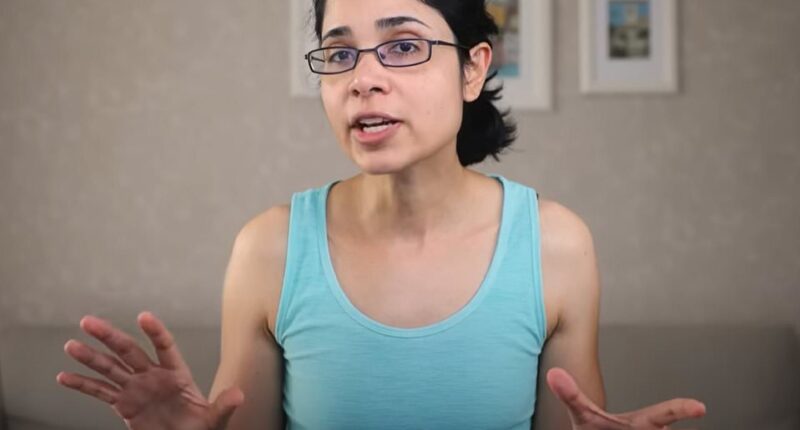
Stepping on the scales, Richa Prasad was shocked to find she’d lost 20lbs without even trying.
The 39-year-old woman had recently moved from the United States to Portugal before her weigh-in. She believes that three ‘odd’ habits she unintentionally adopted in the European country are responsible for her unexpected weight loss.
The US has one of the highest obesity rates in the world, with more than 40 percent of US adults an unhealthy weight.
This compares to Europe where just over 16 percent of adults are considered obese, while Portugal falls just below this percentage mark.
Health experts attribute this change to several factors, such as a lower consumption of highly processed foods, reduced exposure to unhealthy food advertising, and decreased dependence on cars for short trips.
And proving this difference, Richa said she lived it for herself.
Firstly, she says she started applying a ‘slow and steady mindset’ to everything from mealtimes to work.
During her time in the US, Richa habitually ate while on the move. However, in Europe, she noticed that eating while walking garnered strange looks from locals.
The content creator explained: ‘When I first got to Portugal, I’d walk around with a drink in hand, sometimes even having my lunch on [the] go. I felt it productive knocking out two tasks at the same time.
‘But I noticed people kept giving me weird looks. Turns out nobody in Europe walks and eats.
‘Meals last one and a half to three hours even during workdays, not because they’re eating more, but because they’re pacing themselves for conversation.’
Richa says the same relaxed approach applies to drinking alcohol, and in Europe ‘people nurse their drinks for hours… The goal isn’t to drink, it’s to talk.’
A 2018 study found that slow eaters were significantly skinnier than the faster eaters.
Researchers found slow eaters were 42 percent less likely to suffer from obesity than fast eaters, while regular speed eaters were 29 percent less likely to be overweight.
Next up, Richa says she ditched trendy yo-yo diets and regimented workout routines. Instead she took a more consistent approach to food and fitness like her European peers.
This involved eating healthier meals all round and taking daily walks instead of spending hours in the gym.
Offering advice to others, she explains in a YouTube video: ‘Shifting our mindset from dramatic, high-stake sprints to steady consistent marches.
‘Meaning you commit to no longer pendulum swinging between being on a diet or being completely off the rails.
‘Meal prepping with military precision or bingeing on takeout when life gets busy… then doing hardcore workouts as punishment for the binge.
‘Instead, you do what Europeans do. They don’t diet, they don’t start and stop.
‘They just exist in a steady rhythm, and that’s the shift that changed everything for me.’
Lastly, Richa says she stopped snacking after she moved to Portugal.
Instead, she adopted a more regular schedule where she stopped to have regularly scheduled meals.
She ate breakfast at 7am, brunch at 10am, lunch at 4pm and dinner at 6pm.
Commenting on this European approach to eating, the fitness and health coach muses: ‘By and large, they don’t snack. They tend to eat at set meal times and do mini intermittent fasting of three to four hours in between meal times.
‘This in turn reduces the chances of giving into cravings because you’re no longer making a decision every time an urge to eat strikes you.
‘Remember, willpower drains as the day goes on. So the fewer times you have to make a decision the better.’
A 2018 study by the National Institute on Aging found that snacking may be damaging to your overall health and lifespan.
Studying mice, researchers showed those who left more time between eating lived longer and were generally healthier than their snack-prone peers.
Mice who ‘fasted’ between meals had later onset of age-related diseases and healthier glucose levels – regardless of what food or drink the mice consumed.
Controversially, they found that mice lived the longest if they only ate once a day.
And in terms of what you eat, Richa recommends having a non-guilt approach to it, as ‘if you don’t enjoy it, you’re never satisfied’.
She concludes: ‘If you love food, eat like you love food. Europeans eat real butter, full fat cheese and croissants without guilt.
‘They don’t eat with a restrictive mentality where even as you’re digging into that croissant, every bite is taken with guilt, because guess what happens when you eat with guilt: you don’t enjoy it, you’re never satisfied.
‘So you keep eating more and more chasing satisfaction, which ironically becomes harder and harder to achieve because the more you eat, the worse you’re feeling. You’re not actually loving food.’

















